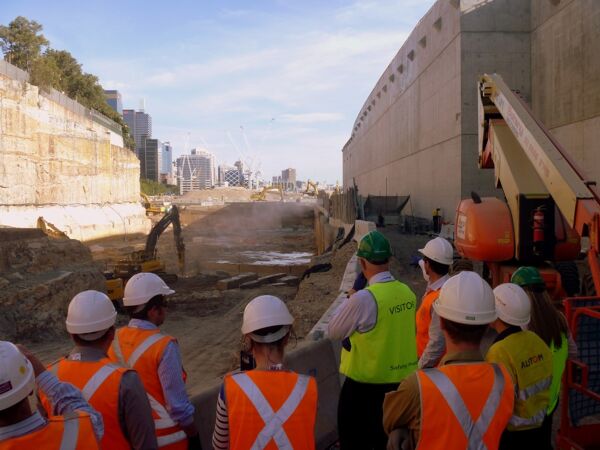
Many of us make New Year's resolutions each year with good intentions (perhaps to lose weight or become more effective at work) but it's easy for these to end up being wishful thinking. But did you know that ICE has a scientifically proven method to help you achieve your professional goals this year? It might not look much, but it is certainly effective: your development action plan and CPD record.
A number of studies have shown that we can move from good intentions to actions with three simple steps:
1. Know what you want to do and why you're doing it
Write down your goals and why they're important to you and/or your organisation. This is your development action plan. So for example, do you want to improve your knowledge of BIM due to a business need (e.g. more clients are asking for it now) or are you interested in possible career opportunities specialising in this area?
A clear definition of the desired outcome will also help you explain how you will know if you have achieved it, and over what timescale you need to work on it. This might be a company deadline for compliance with a given standard, or a personal goal such as achieving a professional qualification.
2. Plan how you will do it
A written plan makes a big difference, particularly when you use it to consider potential barriers and resources required, so that you can develop a strategy to overcome them. One study (1) asked half of a group of elderly patients in Glasgow to write down a detailed plan before their hip operation about how they would keep up their rehab exercises each day, despite the pain involved. Three months later, the patients who had written a plan had recovered their strength and mobility twice as fast as those who attended the same rehab classes and physiotherapy but without making a written plan.
Hopefully opportunities to extend your knowledge and develop your skills aren't actually painful, but many people still find it hard to weave them regularly into their working life. One particularly effective way to do this is to consider cues which will help you get started by using a statement of the form "if/when this happens, then I will do that".
For example, a group of jobseekers (2) were challenged to write out their employment history to help prepare their CVs. Some of them also wrote a short "if/then" statement, e.g. "when lunch is finished and the canteen is quiet, then I'll sit at an empty table and get writing." By the end of the day, 80% of those who'd produced an "if/then" plan had also written out their employment history, while none of the control group had found the time or the inclination. Does this sound familiar to you?
Here are a few "if/then" statements I'm using this year:
- "When I'm doing the ironing, I will put on a recorded lecture from ICE website"
- "During our weekly team meeting, we will include a five-minute slot to review upcoming CPD opportunities in Leeds/York on topics of interest and report back from any events attended in the previous week". This has the added advantage that we can plan travel together, since I'm more likely to go if a colleague is also going
- "On my way home from a CPD event, I will make a note in my diary about how it went, key learning points and whether I found it useful." You can also use the CPD recording tool to do this on your mobile
- "On the first of each month, when I get a calendar reminder with a link to my CPD record, I will review my diary and make a note of CPD activities completed that month e.g. meetings, courses or books"
- I'm an SCE so I have arranged that "Whenever I meet my trainee to discuss his quarterly reports, I will ask him for his current CPD record and provide him with mine". This has the extra kick of accountability by visibly practicing the same behaviours that I require from others. Other good times to use other people to help you stay accountable include your annual appraisal and any interim reviews or one-to-ones with your line manager
- "When I attend meetings in London, I will call into the ICE library and borrow at least one book". Indeed, I often look up topics of interest in the catalogue and, with a few days warning by email, the librarians have it ready for me to pick up. They can also post books to you if that's more convenient. By this method, I've borrowed and read at least several chapters apiece of about 10 engineering textbooks in 2016, which have expanded my knowledge of sustainable transport and flooding
3. Track your progress over time and iterate based on your experience
Regular record keeping has been found to become a "keystone habit" that helps keep you on track, whatever your goals. For example, dieters who keep a food diary of everything they eat at least once a week lost twice as much weight as those who didn't, and researchers found a similar effect when people recorded their weight every day(1).
The CPD recording template gives you the chance not just to keep a regular record of your progress, but also to consider the effectiveness of what you have done, so that you can amend your plan accordingly. And here's my top tip: there is no rule that says you have to evaluate at the same time as you record the activity. In fact, many people find it more useful to quickly record events or books shortly after completion. Then review them every few months to comment on the effectiveness of their various activities having put the knowledge into practice. As a member of the CPD panel, I have read some searingly honest assessments during the annual CPD audit, which ranged from "just what I needed" to "boring", "repeated stuff I already knew" and "terrible networking opportunities"!
So why not give it a try today by downloading the ICE's CPD recording template or setting up your new year's goals in the CPD recording tool? You might just surprise yourself.
The studies referenced in this article are quoted in the following two books:
(1) The Power of Habit, Charles Duhigg (Random House, 2012)
(2) Pre-Suasion, Robert Cialdini (Random House, 2016)



